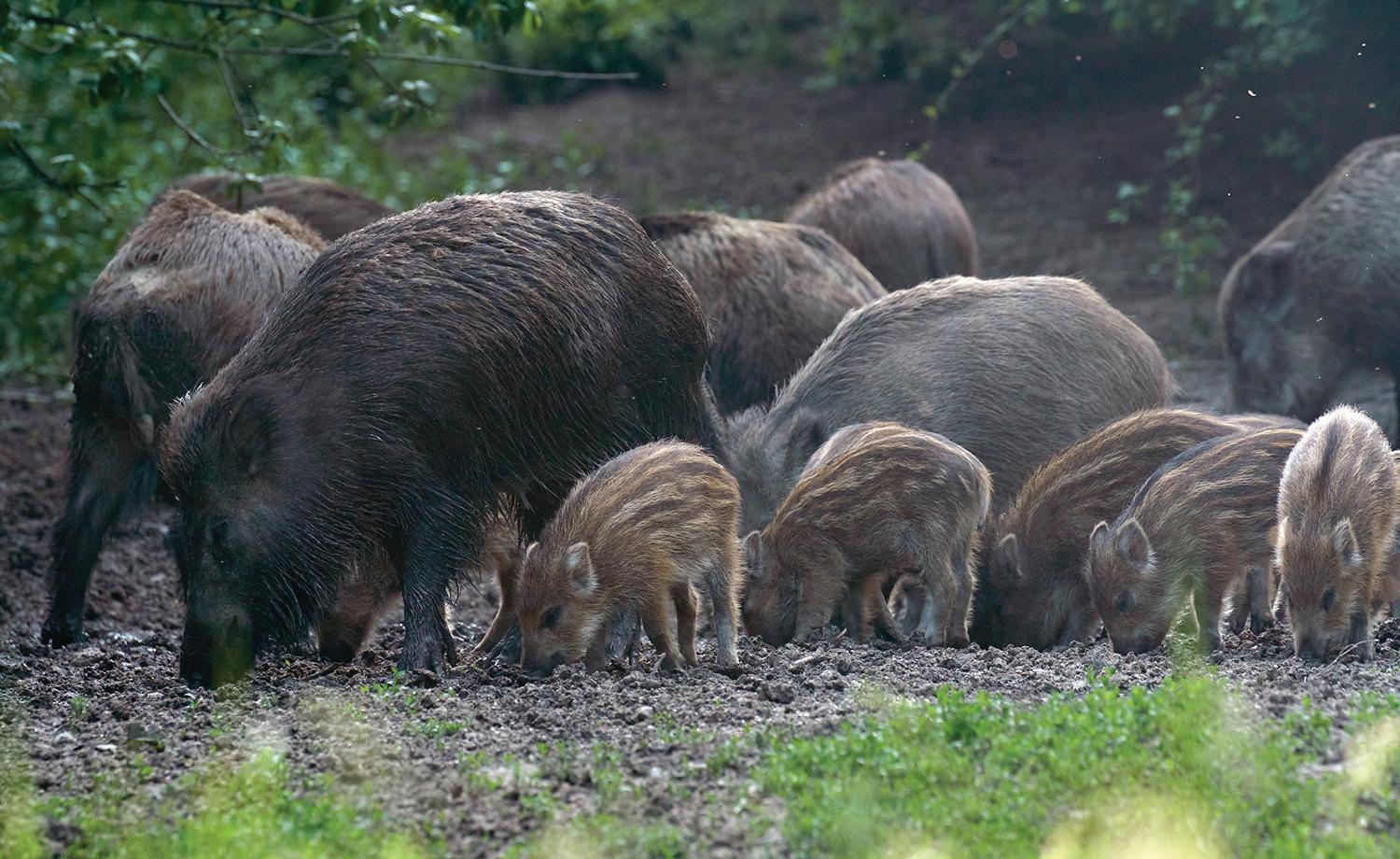
22 minute read
Unwelcome wild thing
Feral hogs cost Louisiana farmers $91 million annually.
By Olivia McClure
From rooting up crops to destroying farm infrastructure, Louisiana’s growing population of feral hogs causes $91.1 million in damage to agricultural and timber lands each year, according to a newly released LSU AgCenter estimate.
Based on responses to a 2021 survey, the study found that hog damage costs landowners $66.2 million in crop losses and $24.9 million in other expenses annually. More than 950 people completed the survey, representing nearly 660,000 acres of crop fields, pastures and woods.
The hogs cause a myriad of problems to Louisiana agriculture, an industry worth about $12 billion annually. They root up, wallow in and trample crops, tree seedlings and wildlife food plots. They also are known to wreak havoc on pastures, drains, levees, fences and waterways.
“Feral swine continue to be a growing problem to farmers, ranchers, foresters and landowners in many areas of the U.S. and are considered to be one of the most damaging invasive species in existence,” wrote study authors Michael Salassi, associate vice president and program leader for plant and animal sciences; Melissa Cater, director of the Northeast Region; and Glen Gentry, director of the Doyle Chambers Central Research Station and the Bob R. Jones-Idlewild Research Station.
Where did they come from?
Feral hogs have been part of the American landscape since the 1500s, when early explorers imported swine as a food source. Free-range livestock management practices and escapes from enclosures led to the first feral hog populations taking hold.
In the 1900s, the Eurasian wild boar was introduced to some states for sport hunting. Modern feral swine are a combination of escaped domestic pigs, wild boars and hybrids of the two.
Today, feral swine are a combination of escaped domestic pigs, wild boars and hybrids of the two.
at least 34 other states, feral hog populations have exploded in recent decades. In 1982, an estimated 2.4 million feral hogs lived in the United States. Today, experts believe that figure could be as high as 9 million.
The Louisiana Department of Wildlife and Fisheries estimates between 700,000 and 900,000 of the animals live in the state. Many of the AgCenter survey respondents said they feel the number of hogs has grown on their properties in the past few years.
Feral hogs multiply quickly, with sows able to have two litters of five to six piglets per year. They have few natural predators and can thrive in almost any habitat, whether it be a tidal marsh or a hardwood forest. Their rapid reproduction and resilience make population control difficult.
“Statisticians have estimated that approximately 70% to 75% of the population must be harvested to control feral swine numbers,” the authors wrote. “In Louisiana, hunters harvest less than half, so populations continue to grow.”
Crop losses and other damage
The study indicates annual production losses were greatest for sugarcane, rice, corn, hay, soybeans and timber. Those losses ranged from $6.9 million for timber to $14.8 million for sugarcane.
About a quarter of the 952 respondents reported damage to pastures, something the study leaders estimate to cost $5.4 million statewide annually.
Some other loss estimates of interest include replanting damaged crop fields at $5.6 million, damage to drains and levees at $4.3 million and redisking damaged fields at $2.3 million.
Nearly 70% of survey respondents said feral swine had interfered in some way with their farming operations in the past year. And a majority expressed concern for the safety of themselves and their families, pets and livestock.
“Although feral swine generally prefer less interaction with humans, their rapidly expanding population and constant search for food sources is causing increasing interactions with producers and foresters on agricultural lands,” the authors wrote.
To view a full report on the study’s findings, visit https://bit.ly/3SxA1hw.
Olivia McClure is an associate communications specialist at LSU AgCenter. She may be reached at omcclure@agcenter.lsu.com.

RICE AWARDS



{ } Horizon Ag, Rice Farming and USA Rice are proud to bring you the recipients of the 2022 Rice Awards. The program highlights three honorees for their contributions to the success of the U.S. rice industry through the Rice Farmer of the Year, the Rice Industry Award and the Rice Lifetime Achievement Award.
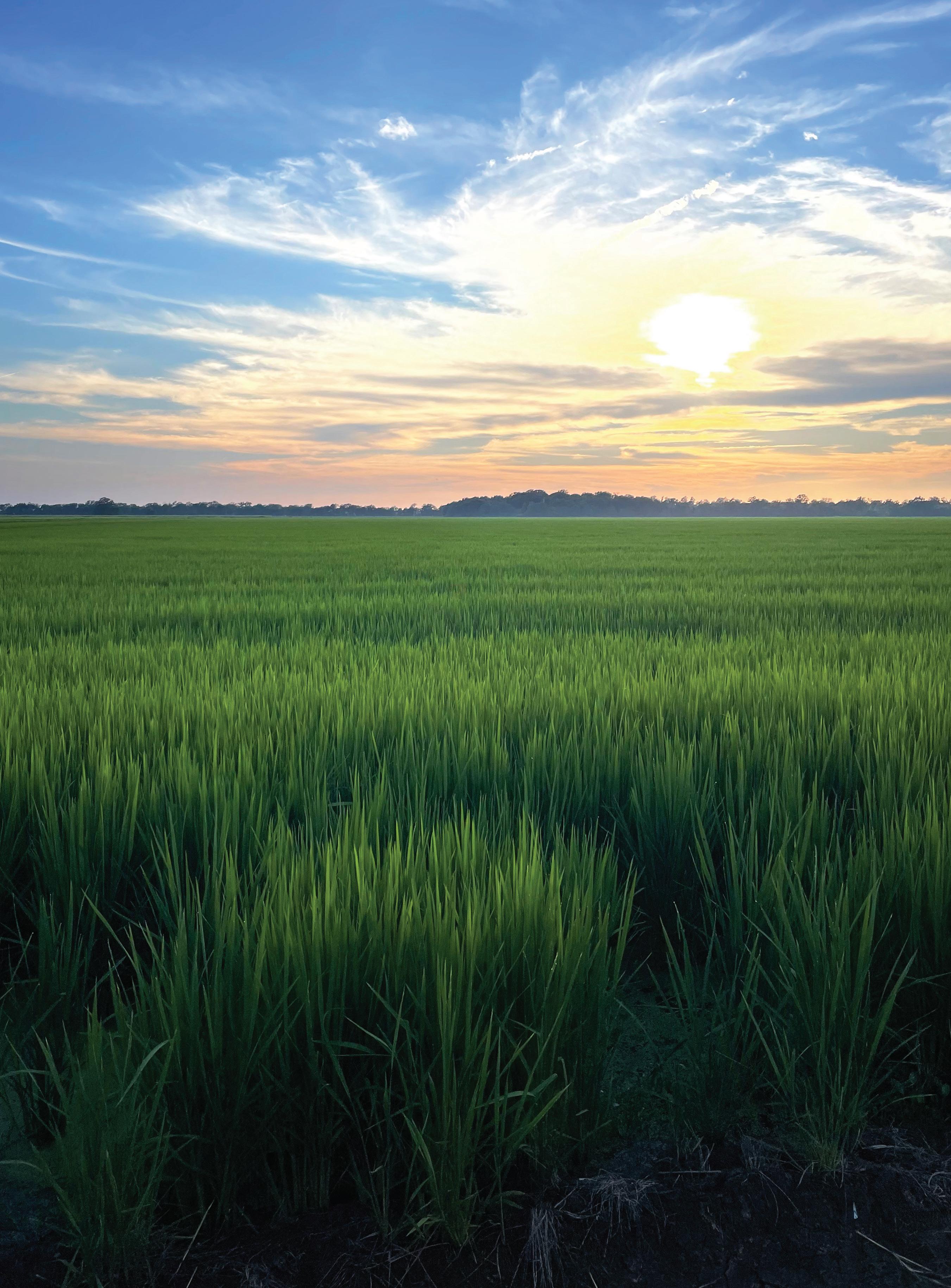

Paul O. Johnson
RICE FARMER OF THE YEAR AWARD
Paul O. Johnson grew up in Southwest Louisiana, surrounded by rice elds, waterfowl and people who love the lifestyle as much as he does. roughout high school and college, he worked for his older brother, Jim Johnson. When a small farm became available, Jim told Paul it was time for him to get started on his own.
Although he had no collateral or credit, Paul went to a local bank with his budget and business plan in hand, and the bank supported him. e young farmer planted his rst crop in 1996, then picked up a larger piece of land and farmed about 450 acres his second year and continued to grow his operation from there.
John K. Saichuk, Ph.D., retired Louisiana rice specialist, said, “I came to respect Paul and his family for their knowledge, integrity and devotion to rice farming. ey farm in extreme southern Louisiana in an environment where rice diseases are a constant problem, hurricanes have introduced salt water and the low-lying areas require special skills to grow rice.”
For most of his career, Paul grew rice in Cameron Parish and now farms in southern Je Davis Parish where rotation options include rice, craw sh and cattle.
“I was planting rice and not rotating with anything else,” he said. “In 2012, I planted my rst Jazzman rice as a specialty crop — an option to diversify within rice. e 2022 season was my largest Jazzman crop year when I grew about 1,250 acres of CLJ01. I like being able to contract the rice before I ever put a seed in the ground.” e bulk of Paul’s Jazzman goes to Supreme Rice Mill, and the rest is processed at Falcon Rice Mill, both of which are in Crowley, Louisiana. He also has utilized the Provisia rice technology.
Steve Linscombe, Ph.D., LSU AgCenter rice breeder emeritus, said, “Paul has become the premier producer of Jazzman rice in Southwest Louisiana and does an outstanding job in producing a ratoon crop. In addition, Paul in as excellent steward of the land and does a stellar job of waterfowl habitat creation.”
In the early years of his career, Paul had experience on a large farm guiding duck and goose hunting and growing rice on it as well. When property owner Tom Henning, along with his son, Grant, established a guide service and hunting lodge on several thousand acres near ornwell, Louisiana, he was looking for someone who could operate the rice farm with an emphasis on creating the best environment for waterfowl. Paul’s background in working with the two together made him the perfect candidate.
“Today, we look for ways to make the rice as productive as it can be, but we also manage about 8,500 acres for waterfowl,” Paul said. “We are trying to make the land more e cient to accomplish both of those tasks.
“ is may involve irrigation, land leveling, putting in water control structures or updating pumps. We do whatever it takes to be more e cient and bene t both the rice and the waterfowl.”
Kyle Soileau, rice stewardship coordinator for Ducks Unlimited and USA Rice said, “When it comes to management of our natural resources and wildlife, Paul Johnson leads the pack. He is a devout family man who shares with his children his enthusiasm for growing rice and improving wildlife habitat.”
When asked what he enjoys most about his life as a Louisiana rice farmer, Paul quickly replied, “ e people, and speci cally, my family. Our lives revolve around rice. I’ve have rented a small, 70-acre farm for my oldest three boys where they can grow some rice and craw sh a little bit by themselves as well. ey do the majority of the work and learn what it is to handle money.
“In addition to my brother and my nephew, James Angelle, I also have good friends who are fellow farmers that I talk to on a daily basis. I also enjoy the relationships I’ve made within the industry, including the folks at Supreme Rice Mill, Falcon Rice Mill and the people I met while participating in the Rice Leadership Development Program. is experience really opened my eyes to the rice industry outside of my immediate area.”
In recognition of his rice production skills, dedication to creating viable wildlife habitat, and his role as a Christian family man, we are proud to name Paul O. Johnson as the 2022 Rice Farmer of the Year.
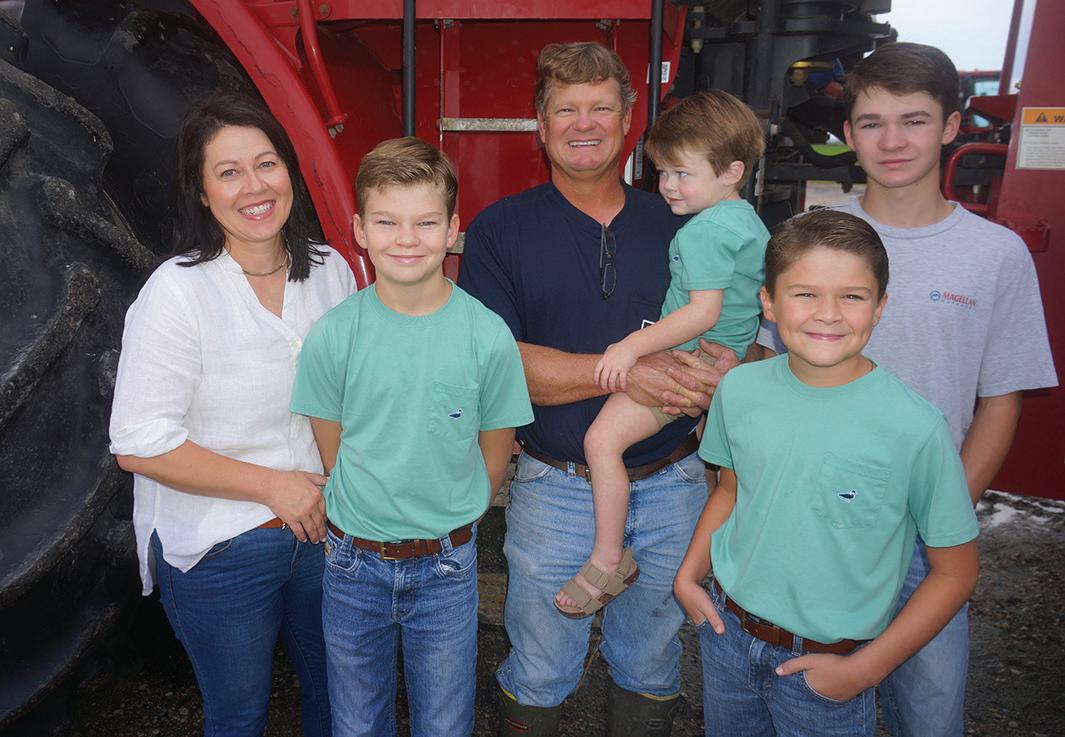
PHOTOS BY BRUCE SCHULTZ
Paul Johnson pictured with his wife, Jessa, and sons (left to right) Luke, Matthew, John and Jude.
Welsh, Louisiana

•President and board member of Louisiana
Rice Growers Association. •Past president and board member of Jeff
Davis Rice Growers Association. •Vice chair, Rice Promotion Committee. •USA Rice board member, Communications and Asia Trade Policy Subcommittee. •Jeff Davis Soil Conservation Committee board member. •Jeff Davis Rice Advisory Committee. •Louisiana Rice Promotion board member. •Thornwell Warehouse board member. •Past board member of Jeff Davis Parish Farm
Bureau. •Member of Ducks Unlimited. •Ducks Unlimited RCCP participant. •CSP Conservation Stewardship. •Rice Leadership Development Program graduate. •Wife, Jessa Johnson. Four sons: Jude, 16;
Luke, 12; John, 10; and Matthew, 3.
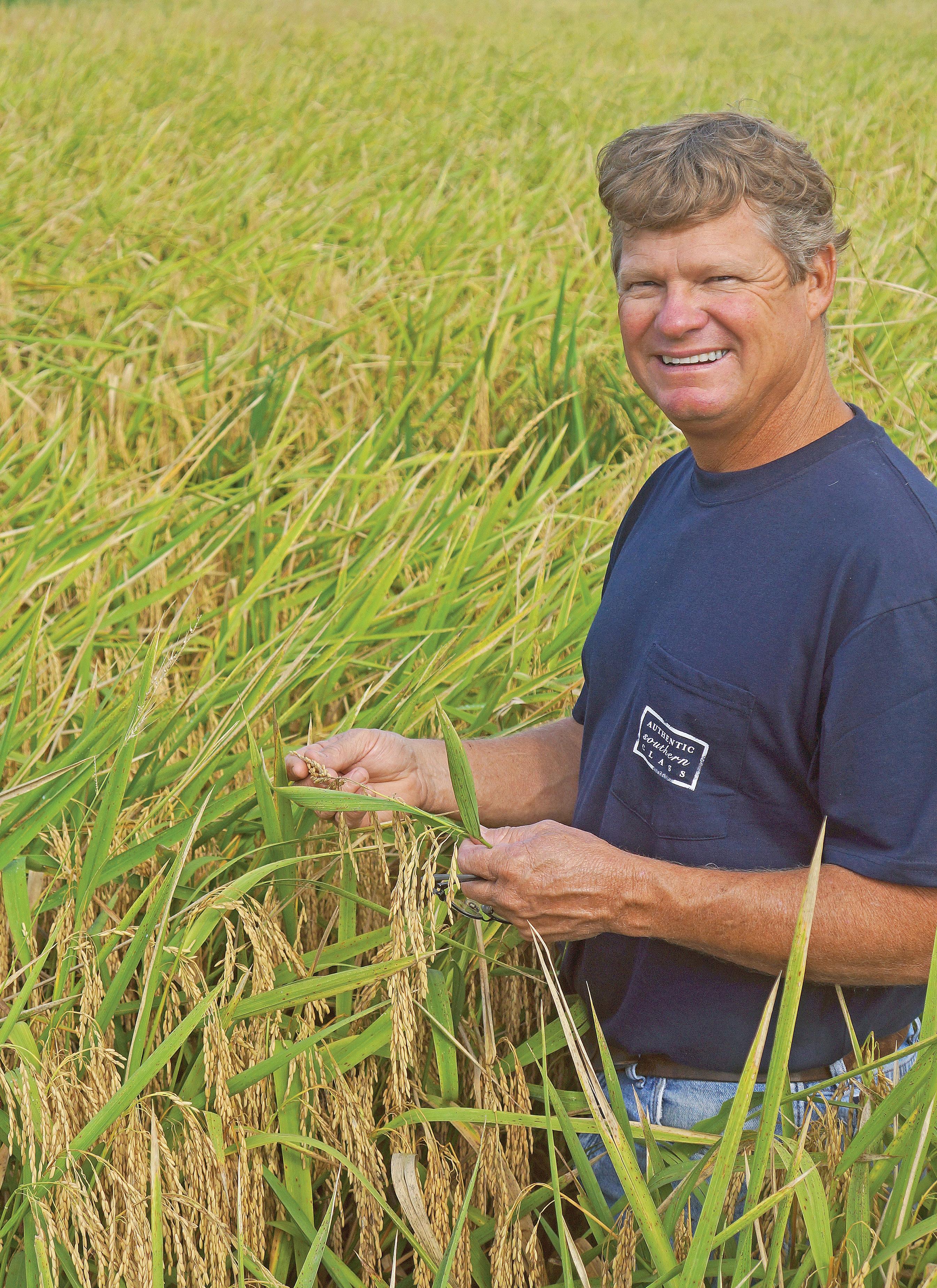
Dr. Yeshi Wamishe

RICE INDUSTRY AWARD
As a young girl, Dr. Yeshi Wamishe followed the tradition of other children in Ethiopia to help both parents in all aspects of the household. She weeded the farm, herded cows, sheep and goats, cut ax and took care of her mother’s vegetable plots in the backyard.
However, when she was a sophomore in college, her dad passed away before harvest, and her brothers weren’t close by to take care of it. As was expected, Wamishe went into the eld to nish the season. e next year, she had to farm potatoes to secure the survival of the family. is set of circumstances, she would say, was the turning point for her to learn the value of farming.
Wamishe went on to obtain degrees in biology and botany from Addis Ababa University in Ethiopia. Later, an opportunity allowed her to travel to the United States where she completed a doctorate degree in plant science/ plant pathology at the University of Arkansas.
When a post-doctoral research job in Stuttgart, Arkansas opened up, Wamishe worked under Dr. Yulin Jia, a USDA-ARS molecular plant pathologist, and learned the molecular aspects of rice diseases. During her two years in this position, she characterized 200 isolates of the sheath blight pathogen using both a conventional and a molecular approach. A few were found to be useful to detect small di erences among rice germplasm for resistance to sheath blight. In addition, Wamishe also identi ed two resistance genes against rice blast using a molecular approach.
Dr. Jia said Wamishe was very creative and made unique contributions that bene ted rice farmers. She delivered reliable and correct disease diagnosis, suggested e ective disease management options and provided Extension education.
Typically, proactive action is required to e ectively manage rice diseases. Wamishe always gave timely management options in person or in texts, phone calls, blogs and newsletter updates. She also o ered training at crop management conferences, scouting schools, rice colleges, winter and IPM meetings and virtual or in-person eld days.
Dr. Xueyan Sha, senior rice breeder and professor with the University of Arkansas System Division of Agriculture, noted, “Yeshi played a critical role in identifying that hydrogen sul de toxicity contributes to a common physiological disorder called autumn decline, developed an e ective management practice by collaborating with both agronomists and soil scientists and greatly alleviated the problem.”
Poinsett county agent Craig Allen added that Wamishe’s willingness to educate agents and growers is unparalleled in the industry, and Arkansas farmers have bene ted greatly from her dedication and tireless e orts.
Wamishe said prior to taking her current position, she had the opportunity to teach at junior colleges in Georgia and Mississippi.
“While on these jobs, however, I was searching for one that would take me back to the eld and connect me to farmers,” she said. “I often imagined the feeling of my dad who had to go before harvesting his crops.
“Working for the University of Arkansas System Division of Agriculture as an Extension plant pathologist took me back to the eld and connected me to producers as I wished. is has been like a dream come true for me to share the feelings of producers from planting to harvest.”
Perhaps Dr. Rick Cartwright, one of Wamishe’s mentors, best summed up the essence of her love for rice and the people who are involved with it.
“During her time in rice, Yeshi has been extremely dedicated to the crop, its production system and sustainability, to the overall industry and, more than anything else, to the people involved,” said Cartwright, retired rice pathologist and director, Cooperative Extension Service UA System Division of Agriculture.
“She never says no to anyone who needs help in rice . e truth is that I have never met a more dedicated, positive and technically pro cient eld scientist than Yeshi. She is such a great people person and bridge builder. It has been the highest privilege to call her friend and colleague.”
Because of her scienti c contributions to the U.S. rice industry and her determination to succeed and help others, we are proud to present Dr. Yeshi Wamishe with the 2022 Rice Industry Award.

Dr. Yeshi Wamishe (third from right) and her husband, Bantu Amare, (back row, fourth from left) pictured with their family.
Stuttgart, Arkansas


• B.S., Biology, minor in Chemistry. M.S., Biology/
Botany, Addis Ababa University, Ethiopia. • Ph.D., Plant Science/Plant Pathology, Department of Plant Pathology, University of Arkansas. • Associate Professor, Extension Plant/Rice
Pathologist, University of Arkansas. • Member: American Phytopathological Society;
Southern Division Phytopathological Society. • Board, committee member: Arkansas Association of Cooperative Extension specialists. • Member: National Association of County
Agricultural Agents and Arkansas County
Agricultural Agents Association. • Member: Rice Technical Working Group. • Member, Gamma Sigma Delta — Honor
Society of Agriculture; Ag Development
Foundation; and Arkansas Alumni. • 2021 JW White Outstanding Rice Breeding team award. • 2017 team award in Publication, Arkansas
County Agricultural Agents Association. • Team award: 2015 Outstanding Educational
Materials, Arkansas Row Crops Blogs. • Team Award: 2014 Outstanding Educational
Materials, Rice Update Newsletter. • Team award: 2012 Certifi cate of Excellence for outstanding educational materials — Websites,
Blogs and Social Media. • Husband, Bantu Amare. Three sons: Ambex
Bantu (wife, Emnet Aklilu), Likeselam Bantu (wife, Zelalem Mekuria) and Tikurete Bantu (wife, Betty Fiseha). Four grandchildren: Mena
Bantu, Elet Bantu, Zema Bantu and Lilly Bantu.
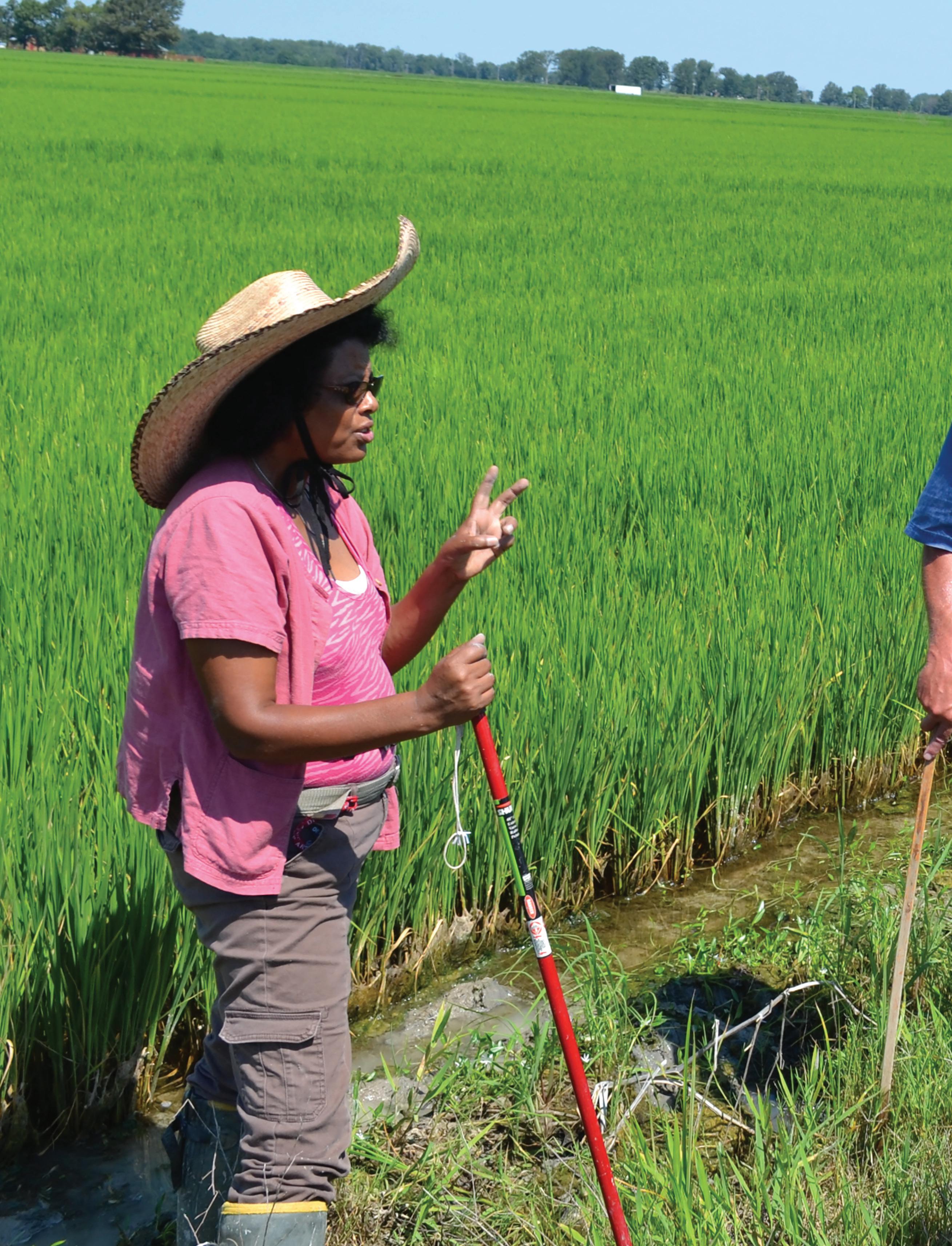
Dr. Karen Moldenhauer
RICE LIFETIME ACHIEVEMENT AWARD
Dr. Karen Moldenhauer grew up in the small town of Garnavillo, Iowa, where corn and hay elds are an integral part of the landscape. With an interest in art and an aptitude for science, she always knew she would pursue higher education and have a career.
Moldenhauer’s family had ingrained her with this mindset, and, for her mother, who had chosen to study diatetics, it was personal. After completing an undergraduate degree from Clark College in Dubuque, Iowa, the elder Moldenhauer was eager to learn more. Toward the end of World War II, Moldenhauer’s mother received a fellowship from the University of Iowa to work on a master’s degree in community nutrition. In 1947, when the war ended and her husband came home, the university realized she was married and rescinded the fellowship.
Consequently, Moldenhauer’s mother was unable to complete her master’s degree. However, this turn of events reinforced her desire to push her daughter, Karen, to get an advanced degree that no one could take away from her.
“Actually, I think this was pretty neat because in many German households, the girls are not often encouraged to pursue a higher education,” Moldenhauer said.
After nishing her doctorate in plant breeding at Iowa State University, Moldenhauer accepted a position as a rice breeder at the University of Arkansas. She said the inspiration to do her best work in this area was feeling she could make a di erence for the rice producers of Arkansas and the southern growing region. Moldenhauer also enjoyed the challenge to come up with higher-yielding varieties.
“Developing very high-yielding conventional and Clear eld varieties — LaGrue, Wells, Diamond, CLL16 and CLL18 — along with improving blast resistance in higher-yielding varieties have all bene ted rice producers,” she said.
Nathan McKinney, director of the Arkansas Agricultural Experiment Station, noted that at one point almost all the acreage planted in Arkansas originated in Moldenhauer’s program.
“Karen’s releases have become parent material for many second- and third-generation varieties, making an impact on multiple breeding programs, which extended her program’s in uence in the Mid-South,” he said. “ is was accomplished mostly by collaborative e ort and a teamwork approach. Karen has included geneticists, pathologists, agronomists and physiologists in the breeding process.
“She has sought the advice and input of farmers, rice millers and end users throughout her career. She has worked closely with our Extension specialists to ensure that every variety has a full complement of production recommendations prior to release. Karen is recognized by her peers in academia and industry as a tireless and innovative scientist. She has cultivated industry relationships that help the breeding program remain relevant.”
Although Moldenhauer is recognized as a champion for the Arkansas rice industry, her in uence has extended well beyond the state. During her career, she also was responsible for more than $10 million in extramural funding from a number of sources and produced numerous publications.
Dr. Kent McKenzie, retired director and plant breeder at the California Cooperative Rice Research Foundation-Rice Experiment Station, noted, “It has been said that ‘plant breeding is about time, talent and numbers,’ and it is overwhelmingly clear from her resume that Dr. Karen Moldenhauer has covered those bases very well. She arrived without a rice background and under her leadership built the University of Arkansas rice breeding program to what it is today.”
Riceland’s Dan Kennedy said, “Dr. Karen Moldenhauer has been a cornerstone for rice research in Arkansas since 1982. Her peers and the rice industry have recognized her success in rice breeding, and in 2001, Riceland presented her with its Friend of the Farmer Award.”
In recognition of her determination to develop the next best rice variety, collaboration with all segments of the rice industry and resolution to always do her best in both her personal and professional life, it is an honor to name Dr. Karen Moldenhauer as the recipient of the Rice Lifetime Achievement Award.
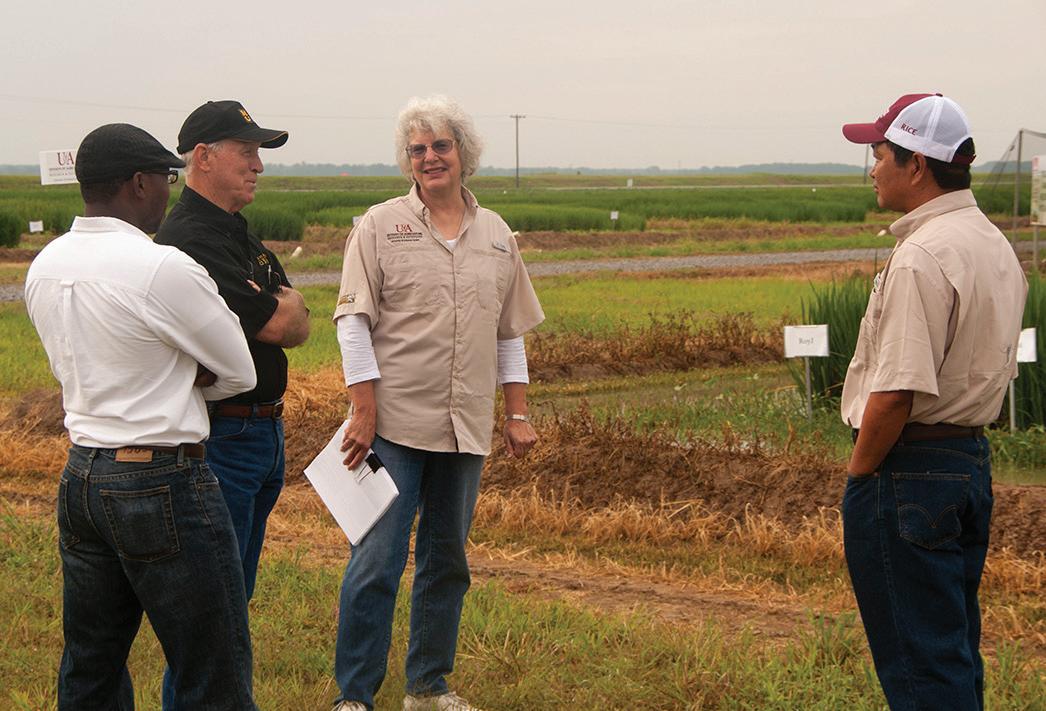
PHOTOS COURTESY DR. KAREN MOLDENHAUER Drs. Karen Moldenhauer and Xueyan Sha (far right) discuss the rice breeding program with individuals between field day stops at a UADA Rice Research and Extension Center field day near Stuttgart, Arkansas.
Stuttgart, Arkansas


• B.S., Biology, Iowa State University. M.S., Plant
Breeding, North Carolina State University. • Ph.D., Plant Breeding, Iowa State University. • Retired Interim Director Rice Research and
Extension Center Professor and Rice Industry
Chair for Variety Development. • Served in many professional societies, including
American Association for the Advancement of
Science (Fellow), American Society of Agronomy (Fellow), Crop Science Society of America (Fellow), the Rice Technical Working Group. • Engaged in the activities of the Arkansas Rice
Research and Promotion Board, Arkansas Seed
Dealers, Arkansas Seed Growers, and the
Arkansas Seed Council. • Member of the National Genetic Resources
Advisory Council, 2011-2017. • Served as Technical Advisor to the US Rice Federation Rice Marketability and Competitiveness
Task Force and the US Rice Federation Technical
Task Force. • Served on the Board of Trustees for the International Rice Research Institute (IRRI), 2016-2018. • John White Outstanding Research Award, 2021. • RTWG Distinguished Service Award, 2020. • Board of Trustees for the International Rice
Institute, 2016-2018. • John White Outstanding Research Team Award, 2004. • First recipient of the Rice Industry Chair for
Variety Development, 2002. • Husband, Paul. Two sons: Jonathan and Henry.
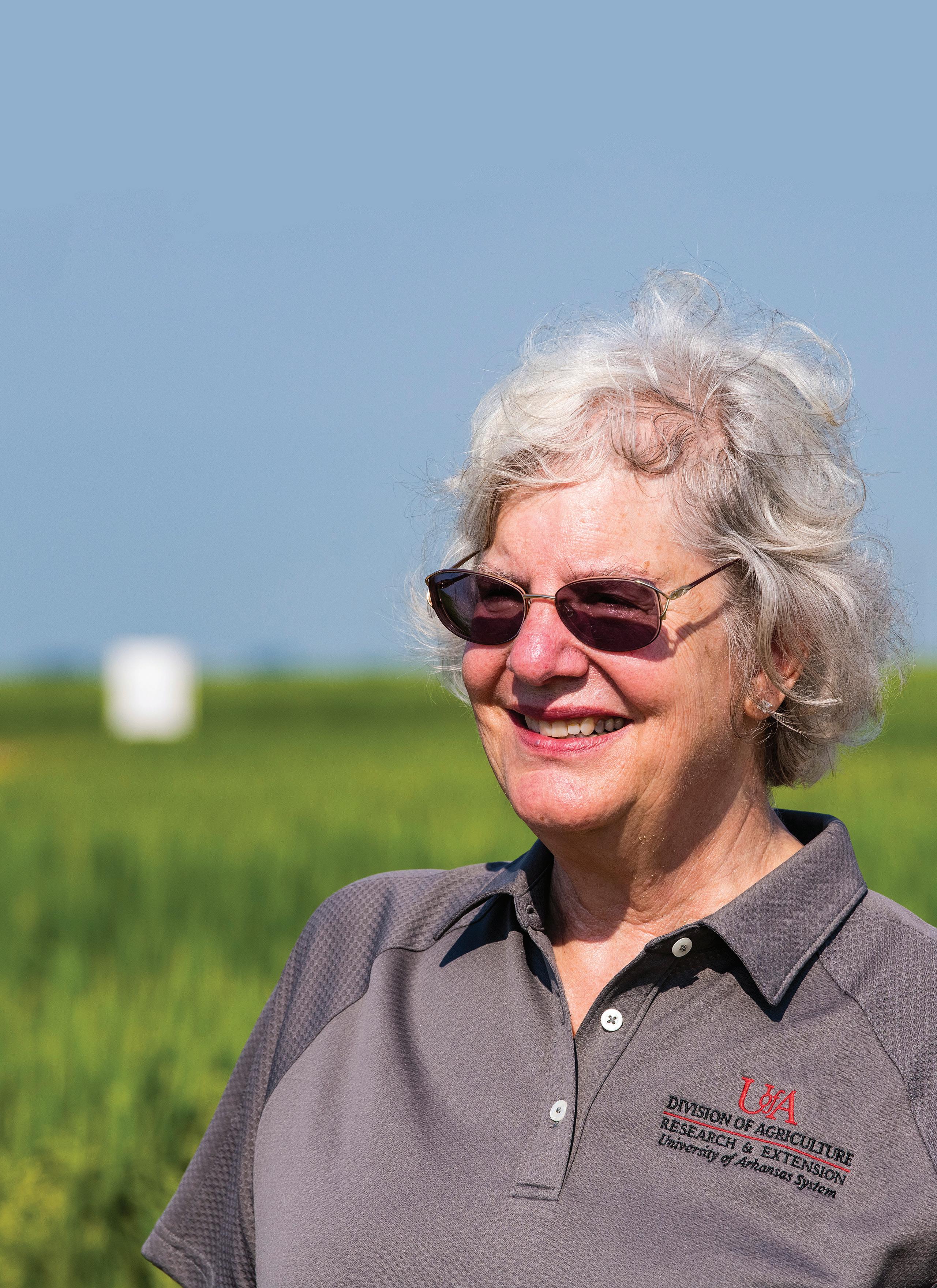
1992 Dennis Leonards
1993 Jacko Garrett Jr.

1994 Nolen Canon
1995 Duane Gaither
1996 Leroy & Chris Isbell 1997 Charles Berry John Denison Paul Haidusek Errol Lounsberry Charley Mathews Jr. Patrick Mullen Fred Tanner
1998 Tommy Andrus Don Bransford Larry Devillier Jr. Dennis Robison Gary Sebree Linda Zaunbrecher
1999 Ken Collins James “Jimmy” Hoppe Charles Parker Johnson Abbott Myers Lowell George “L.G.” Raun Jr. Martin Walt Jr.
2000 John B. Alter R. Ernest Girouard Jr. Bill Griffith Ken Minton Michael Rue J.D. “Des” Woods
2001 Rice Farmer of the Year: Larry and
Candice Davis Rice Industry Award: Jack William Rice Lifetime Achievement Award:
David LaCour
2002 Rice Farmer of the Year: Tommy Ray Oliver Rice Industry Award: Howard Cormier Rice Lifetime Achievement Award:
Leland L. Carle
2003 Rice Farmer of the Year: David
Monroe Smith Jr. Rice Industry Award: Dr. Johnny Saichuk Rice Lifetime Achievement Award:
Lundberg Brothers 2004 Rice Farmer of the Year: Dane Hebert Rice Industry Award: Dr. M.O. “Mo” Way Rice Lifetime Achievement Award:
Dr. Joseph Musick 2005 Rice Farmer of the Year: John Greer Rice Industry Award: Charles “Eddie”
Eskew Rice Lifetime Achievement Award: Donald
Bransford Rice Industry Award: Chuck Wilson Rice Lifetime Achievement Award: John
Denison
2007 Rice Farmer of the Year: Clarence Berken Rice Industry Award: Dr. Joe Street Rice Lifetime Achievement Award:
Dr. Steve Linscombe
2008 Rice Farmer of the Year: Milton LaMalfa Rice Industry Award: John Cummings Rice Lifetime Achievement Award: Martin
Ahrent
2009 Rice Farmer of the Year: Curtis Berry Rice Industry Award: John E.
Broussard Jr. Rice Lifetime Achievement Award: Carl
Wayne Brothers 2010 Rice Farmer of the Year: Greg, C.J. and
Jeff Durand Rice Industry Award: Dr. Richard J.
Norman Rice Lifetime Achievement Award:
Dr. Elaine T. Champagne 2011 Rice Farmer of the Year: Mark Wimpy Rice Industry Award: Dr. Rick
Cartwright Rice Lifetime Achievement Award:
Jacko Garrett Jr.
2012 Rice Farmer of the Year: Jim Whitaker Rice Industry Award: Dr. Donald Groth Rice Lifetime Achievement Award:
Jim Erdman
2013 Rice Farmer of the Year: Joe Aguzzi Rice Industry Award: Dr. Eric Webster Rice Lifetime Achievement Award:
Elton Kennedy 2014 Rice Farmer of the Year: Fred
Zaunbrecher Rice Industry Award: Dr. Kent McKenzie Rice Lifetime Achievement Award:
Marvin Baden
2015 Rice Farmer of the Year: Jerry Hoskyn Rice Industry Award: Keith Fontenot Rice Lifetime Achievement Award:
Jimmy Hoppe 2016 Rice Farmer of the Year: Richard Fontenot Rice Industry Award: Dr. Steve
Linscombe Rice Lifetime Achievement Award:
Gary Sebree 2017 Rice Farmer of the Year: Christian Richard Rice Industry Award: Dr. Xueyan Sha Rice Lifetime Achievement Award: Chuck
Wilson
2018 Rice Farmer of the Year: Melvin “Skip”
Hula Jr. Rice Industry Award: Earl J. Garber Rice Lifetime Achievement Award: Marvin
Hare Jr. 2019 Rice Farmer of the Year: Jennifer
James Rice Industry Award: Jim F. Cook Rice Lifetime Achievement Award:
Dr. Ford Baldwin Rice Lifetime Achievement Award:
Dr. M.O. “Mo” Way 2021 Rice Farmer of the Year: Nicole Montna
Van Vleck Rice Industry Award: Dr. Qiming “Doc”
Shao Rice Lifetime Achievement Award:
Dr. Kent McKenzie
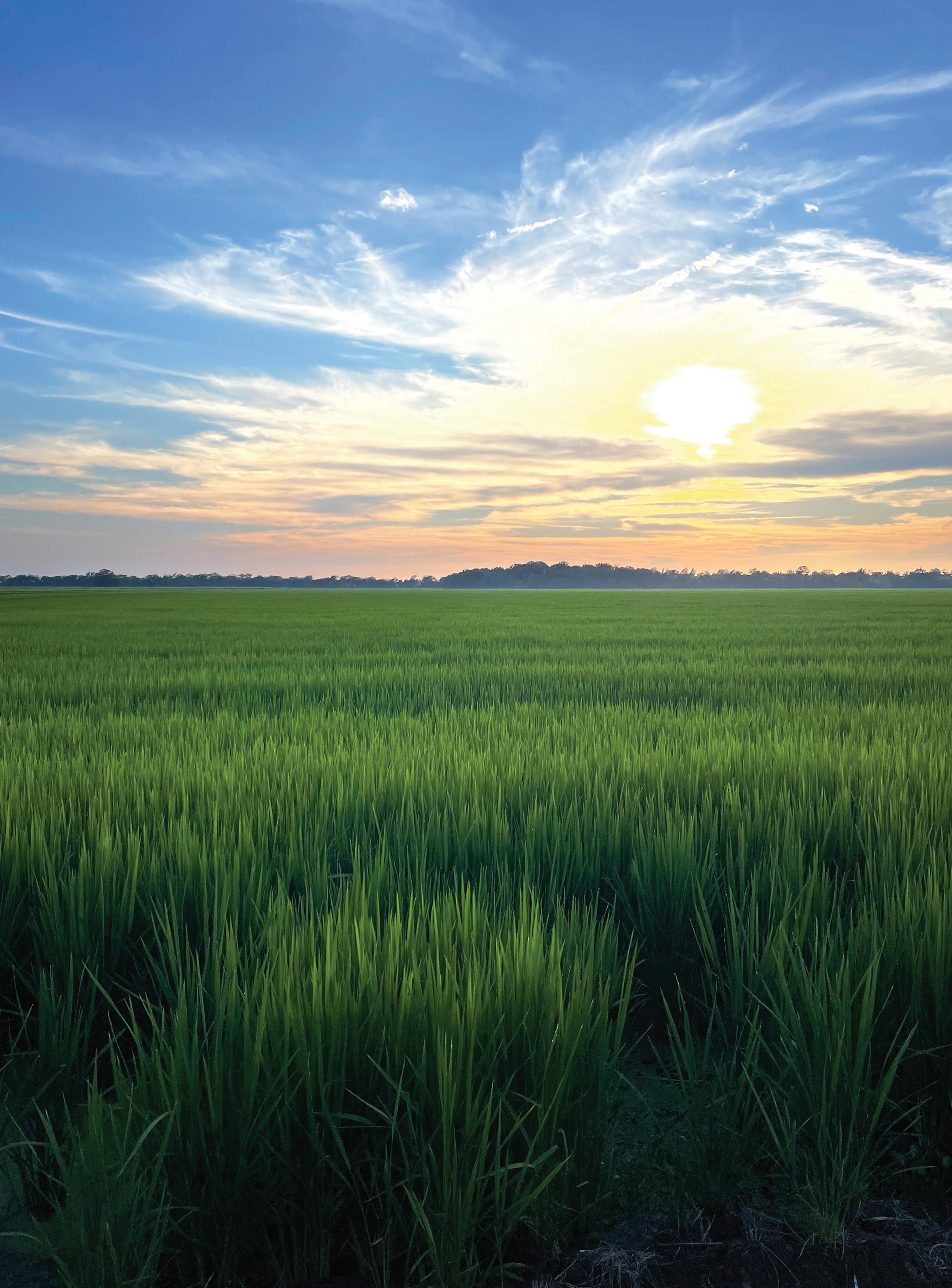
2022 RICEAWARDS
Each year, one of the things I enjoy most about the Rice Farming magazine Rice Awards ceremony is that it brings this great industry together to recognize and celebrate the dedication, hard work and signi cant accomplishments of these award winners. Such is the case at this year’s Rice Outlook Conference, where we’ll honor three outstanding and well-deserving individuals. We’ve come to beautiful Austin, Texas, the host city for this year’s conference, as an industry challenged on many fronts yet committed more than ever to producing a high-quality, bountiful crop that can play a key role in helping feed the world – that will return the U.S. to a place of leadership when it comes to the grain characteristics needed to meet global demand. e award winners recognized here are at the forefront of these e orts, and it is a pleasure to formally say “thank you” for all they do or have done for our industry. e recipients will receive the following awards: e Rice Farmer of the Year Award is given to a farmer who has shown determination, innovation or dedication to growing the crop. e Rice Industry Award honors the person who has proven to be innovative in his or her role in this industry. e Rice Lifetime Achievement Award recognizes the person who has dedicated his or her life to the viability of the U.S. rice industry.
Horizon Ag is proud to again sponsor the Rice Farming magazine Rice Awards, and we sincerely congratulate each award winner.
I hope that this industry continues to recognize the value of working together with the goals of improving U.S. farmer productivity and strengthening the U.S. rice industry.
A good example of this is the recently formed Provisia Working Group, where representatives from Horizon Ag, BASF, leading rice industry retailers and the LSU Cooperative Extension Service are developing recommendations to minimize the threat of weedy rice outcrosses developing to the ACCase-inhibiting herbicide technology. As the provider of elite Clear eld and Provisia rice varieties for the industry, Horizon Ag is excited to be part of that group as we strive to help U.S. farmers be more successful in 2023 and beyond.
Sincerely, Dr. Tim Walker Horizon Ag General Manager
Clearfield and Provisia are registered trademarks of BASF. © 2022 Horizon Ag, LLC. All Rights Reserved.




